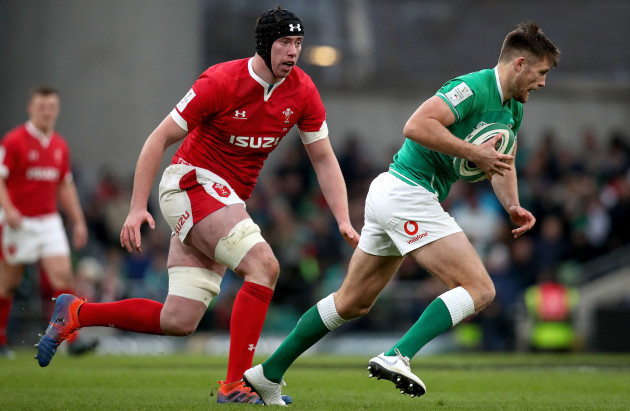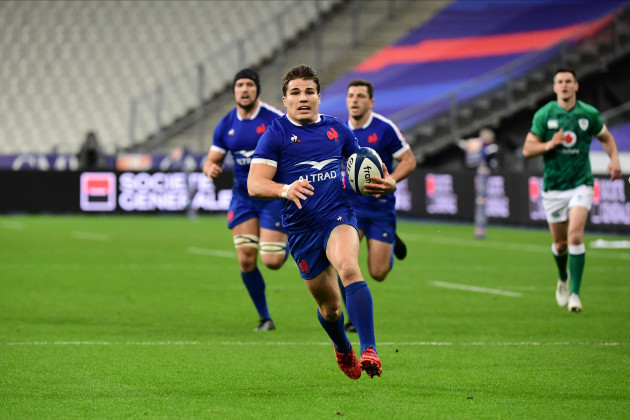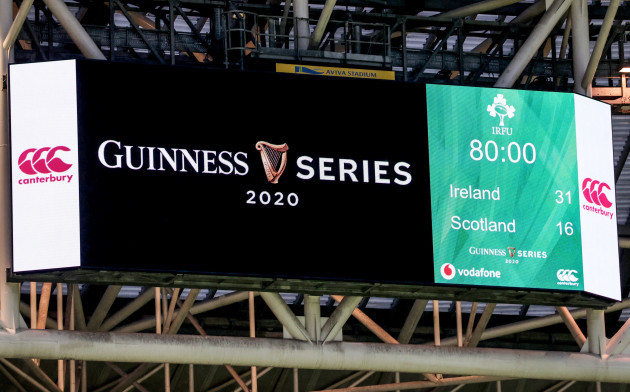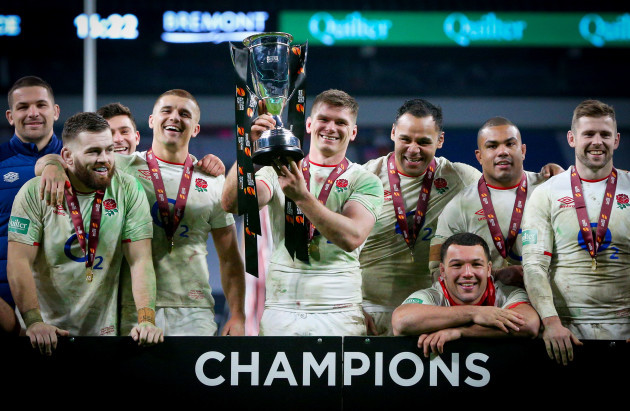LAST UPDATE | 31 Jan 2021
WALES v Ireland (7 February, Cardiff)
WARREN GATLAND WAS in full flow. This was 14 months ago, although it feels like 14 years, a time when social distancing sounded like the name of a racehorse, not an instruction you constantly give your parents, never mind your kids.
We were seated in a coffee dock in one of Dublin’s plusher hotels with only two chocolate biscuits, never mind two metres between us. He was plugging his book; your correspondent was pushing for info about the fall-out with Ireland, the good days with Wales. “I’ve no regrets,” he said of Wales’ narrow loss to South Africa in the World Cup semi-final. “After the defeat, I remember chatting with the coaches and saying how it felt like a sponge after we squeezed every bit of water out of it.”
Wayne Pivac’s problem is that he’s working off the same sponge. Throughout 2020, he tried experimenting – handing out 11 new caps – but after wins against just Georgia and Italy and defeats in Wales’ other seven games, Gatland’s successor has gone back to the past.
Returning is Dan Lydiate, who hasn’t played for Wales since 2018. “Dan is the form six in the competition [Guinness Pro14]; he has been throughout the season,” Pivac said. “He is back playing some of his best rugby. He has a wealth of experience and in the Six Nations we are going to need a lot of that.”
He isn’t the only old timer to come back. Prop Rhodri Jones’s last game for Wales was also in 2018; Adam (grey)Beard and Jake Ball also return, a case of out with the new, in with the old.
“I don’t think anyone is expecting us to be challenging at the minute,” Dan Biggar told The London Times. “But I do feel that if we can get plenty of possession then we will be right in the mix. We need plenty of attempts to put that way of playing on the park. If you are going to cough the ball up in the way we are playing then you are asking for trouble.
“The whole idea of the system we are trying to play is to have threats across the park and to have good athletes and good attacking people in the right areas. The game is pretty simple, isn’t it? If you don’t win enough of the collisions and don’t have enough of the ball, then you are going to struggle.”
To simplify things, Wales did not have enough of the ball in 2020 – and you can guess the rest. Will 2021 be any different? Pivac thinks so, suggesting the short-term pain of his new system will lead to long-term gain. Then, he would say that, wouldn’t he?
Having beaten them twice in 2020, Ireland will head to Cardiff next Sunday without any fear. The absence of fans is another burden removed, Wales having tamed Ireland’s threat in every Six Nations fixture in Cardiff since 2013. Perhaps there is something left to squeeze from that sponge yet we doubt it. You only have to remember their performances in 2020 to be left with the conclusion that Gatland got his timing right when he announced that it was time to go.
Ireland v FRANCE (14 February, Aviva Stadium)
22 February, 2020 felt like one of those days when a baton passed. Wales, the defending grand slam champions, had been beaten, France, a squad with an average age of 24, who had ditched 22 of the 36 players from the 2019 World Cup, had taken their place at the business end of the championship.
In the end, they’d finish second, the same position they came in the Autumn Nations Cup. Some context, though. It took England – 813 caps – until extra-time to win that game against a much-depleted France team – 68 caps.
“We’re going in the right direction, there’s a revival,” said Antoine Dupont, their world class scrum half. “But at the same time it gives me no satisfaction to say: ‘Nice one, we were runners-up in the Six Nations’. In ten years no one will be talking about that. What matters are titles…everybody in France has been waiting for a trophy for ten years. The fervour surrounding us is greater than ever.”
It’s not going to let up. Dupont, Charles Ollivon and No8 Greg Alldritt are at the controls. So, last year, was Romain Ntamack, but injury has ruled him out of the opening couple of games.
No matter. Matthieu Jalibert or Louis Carbonel provide decent cover.
Better again, a ceasefire appears to have been found in the tired old war between the clubs and the national team; Galthié – a supposedly poor man-manager, has reintroduced a bit of va-va voom into the side. Ireland may be in the mix for this year’s championship but so are France. Don’t think otherwise.
ITALY v Ireland (27 February, Rome)
It isn’t particularly hard or smart to be dismissive about Italy’s presence in the tournament. No one, bar the comedian telling the joke, really laughs at a cheap gag. But when you have not won a fixture in this tournament since 2015, when your last, indeed only, Six Nations win over Ireland dates back to 2013, when you have won the wooden spoon in all bar six of the championships you have contested, when you hold the records for most points conceded and fewest scored in a single tournament, when you have profited from being a Tier 1 nation when more deserving sides – Fiji, Samoa, Tonga – are woefully underfunded, then what can else can you say? They’ll finish last again.
SCOTLAND v Ireland (14 March, Murrayfield)
We keep being told that Scotland are on the verge of a big breakthrough. And we keep waiting for it to happen.
Perhaps it never will under Gregor Townsend. Perhaps a couple of good results – like their wins over France and Wales last year – is the best they can hope for.
Certainly they have the bones of a decent side but should Ireland really be worried about going to Murrayfield, considering that when these teams last met, it ended 31-16, Ireland coughing up fewer penalties 10-15; fewer turnovers 3-13; while winning the possession count 57-43.
It may be a different game on 14 March with Finn Russell back at the controls after the Scots went through five different No10s in as many games last year. Russell, though, can be a game-changer in a negative as well as a positive sense. Cameron Redpath’s arrival may give the team an additional creative spark.
Elsewhere, the absence of a truly world class No8 has been a long-standing issue although Hamish Watson and Jamie Ritchie are superbly gifted flankers. Plus, their scrum is effective, although injured hookers Stuart McInally and Fraser Brown will be missed. Dave Cherry, the uncapped Edinburgh hooker, has shown his capacity to break the gainline and may come into the reckoning while Alex Craig, the Gloucester second row, is a decent find.
Is that enough to beat Ireland? We have our doubts.
Ireland v ENGLAND (20 March, Aviva Stadium)
There was a great quote by Dylan Hartley, the former England captain, during the Autumn Nations Cup. As commentators gushed over England’s highly effective defensive gameplan, Hartley – working for Amazon Prime – cut to the chase. “Sure, but it’s really boring, isn’t it? It’s not exciting to watch.”
That’s the thing about Eddie Jones’ England. They’re hard to watch, their coach harder to listen to, their team almost impossible to beat. Well, at least that has been the case for Ireland over the last couple of years. Four games, four losses and the fear that there could be more to come.
“We really haven’t accelerated our rugby,” Jones said last year. “We’d like to play with a bit more fluency but it’s just not there. We got a lot of quick ball early. We weren’t quite as precise as we’d like to be out wide.”
If they do, the rest are in big trouble. It may help that England are missing some significant players for the championship opener – Sam Underhill, Joe Launchbury, Kyle Sinckler, Mako Vunipola and Joe Marler – but it is also worth remembering that they were without Courtney Lawes, Jack Nowell and Manu Tuilagi in the autumn, and stayed unbeaten.
“On the inside, we were always confident,” said George Ford of their autumnal programme. “We had utmost belief that if we carried on working hard and learning from our mistakes that we’d always come through at the end.”
The absence of their props will hurt but minus Underhill, Jones can turn to Tom Curry or Ben Earl. Keeping them company in the back row will be Mark Wilson, superb for Newcastle Falcons this season, Lawes, recovered from injury and viewed by Jones as a blindside.
Plus, you have Paolo Odogwu, the Wasps back who Jones believes has “world class potential”. “Paolo has got power, he has got a bit of an X factor,” he said. “We’re looking for another centre or wing who has that and he’s been consistently dynamic in being able to break lines.”
England, winners of this competition in three of the last five years, start their campaign against Scotland and end it in Dublin.
“Our goal for the tournament is to win it. We want to be an impossible team to play against,” Jones said. “We want to be a team that plays at a level other teams can’t compete against.”
The fear is he’ll be proven right.





